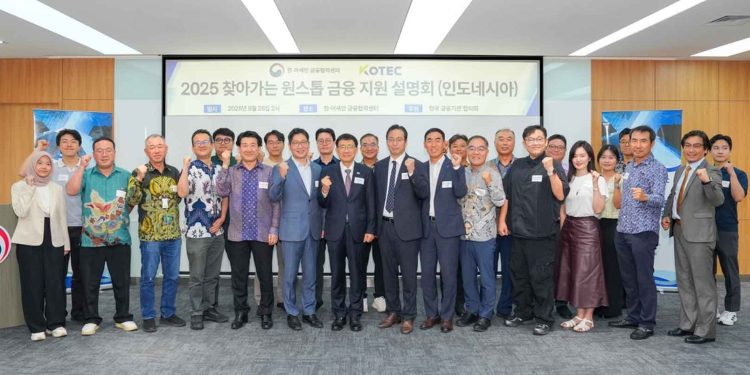As Korean startups expand into ASEAN, the challenge is no longer just market entry—it’s securing the right capital infrastructure to scale. KIBO’s new push in Indonesia signals a shift toward embedding financial tools where growth happens. It marks tangible move to lower barriers and strengthen Korea’s position in Southeast Asia’s competitive innovation economy.
Korea Technology Finance Corporation Hosts One-Stop Financing Seminar in Jakarta
The Korea Technology Finance Corporation (KIBO) has expanded its global financing platform to Indonesia, hosting a “One-Stop Financial Support Briefing Session” in Jakarta on September 25. The event was co-organized with the Korea–ASEAN Financial Cooperation Center and aimed to ease financing challenges for Korean startups and SMEs operating in Southeast Asia’s largest market.
The program included presentations on KIBO’s technology evaluation system and overseas expansion guarantee programs, introductions to bank financing products, insights into Southeast Asian fundraising strategies, and one-on-one investor consultations. During the event, KIBO initiated ₩3.5 billion ($2.6 million) in overseas guarantee support for five Korean firms.
Indonesia’s Role in Korea’s Global SME Playbook
Indonesia has emerged as a priority destination for Korean tech SMEs. With the world’s fourth-largest population and a rapidly expanding digital economy, the country represents both a consumer market and a strategic hub within ASEAN.
KIBO framed the seminar as part of a broader effort to deepen Korea–ASEAN financial cooperation. By connecting Korean companies with local banks, venture capital firms, and investors, the initiative aims to build pathways for cross-border capital flows while reducing the structural barriers SMEs often face in entering new markets.
Inside the Room: Banks, VCs, and Government Voices
The event drew strong interest from stakeholders across the financing spectrum. Representatives from major Korean banks active in Indonesia — including KEB Hana, Shinhan, Woori, and IBK — joined alongside domestic and global venture capital firms such as The Ventures, Indies Capital, InterVest, and Kilsa Global.
Ham Jeong-han, Minister-Counselor at Korea’s Mission to ASEAN, opened the seminar by emphasizing the importance of institutional collaboration. Lee Young-jik, Director of the Korea–ASEAN Financial Cooperation Center, described the event as “a model case of financial cooperation between Korea and ASEAN” and pledged continued support for strengthening local financing ecosystems.
Kwak Yong-joo, head of KIBO’s Singapore branch, highlighted the practical value of the initiative:
“This seminar creates a direct channel for companies to secure guarantees, meet investors, and access capital in one place. We will expand support to help more Korean SMEs attract overseas investment and grow into global enterprises.”
Lowering Risk, Unlocking Capital: Strategic Significance for Korea’s Startup Ecosystem
For Korea’s startup and SME ecosystem, the move carries multiple implications. First, it reflects a shift toward embedding financial infrastructure into entry markets, helping startups go beyond short-term project support to establish sustainable local operations. Second, it strengthens Korea’s positioning as a credible hub in the Asia-Pacific venture capital network, where state-backed guarantees can lower perceived risks for private investors.
Similar programs have underpinned the growth of ecosystems in Singapore and Israel, where government-backed funds created a foundation for global VC participation. For Korea, expanding such support into ASEAN markets offers both risk-sharing for founders and an expanded playing field for investors seeking cross-border opportunities.
ASEAN as Korea’s Next Financial Frontier
KIBO confirmed that the Jakarta seminar will be the first in a series of regular ASEAN-focused financial support programs, with similar events planned in other regional hubs. By pairing state-backed guarantees with private investment networks, Korea is signaling its intent to strengthen its role in the ASEAN innovation economy.
Global founders and investors watching Korea now see that the country is channeling resources not only into domestic R&D and venture capital but also into the financial infrastructure that helps startups establish themselves in new markets. If this strategy continues, Korea could strengthen its role as both a launchpad and a bridge into one of the world’s most dynamic regional ecosystems.
🤝 Looking to connect with verified Korean companies building globally?
Explore curated company profiles and request direct introductions through beSUCCESS Connect.
– Stay Ahead in Korea’s Startup Scene –
Get real-time insights, funding updates, and policy shifts shaping Korea’s innovation ecosystem.
➡️ Follow KoreaTechDesk on LinkedIn, X (Twitter), Threads, Bluesky, Telegram, Facebook, and WhatsApp Channel.






